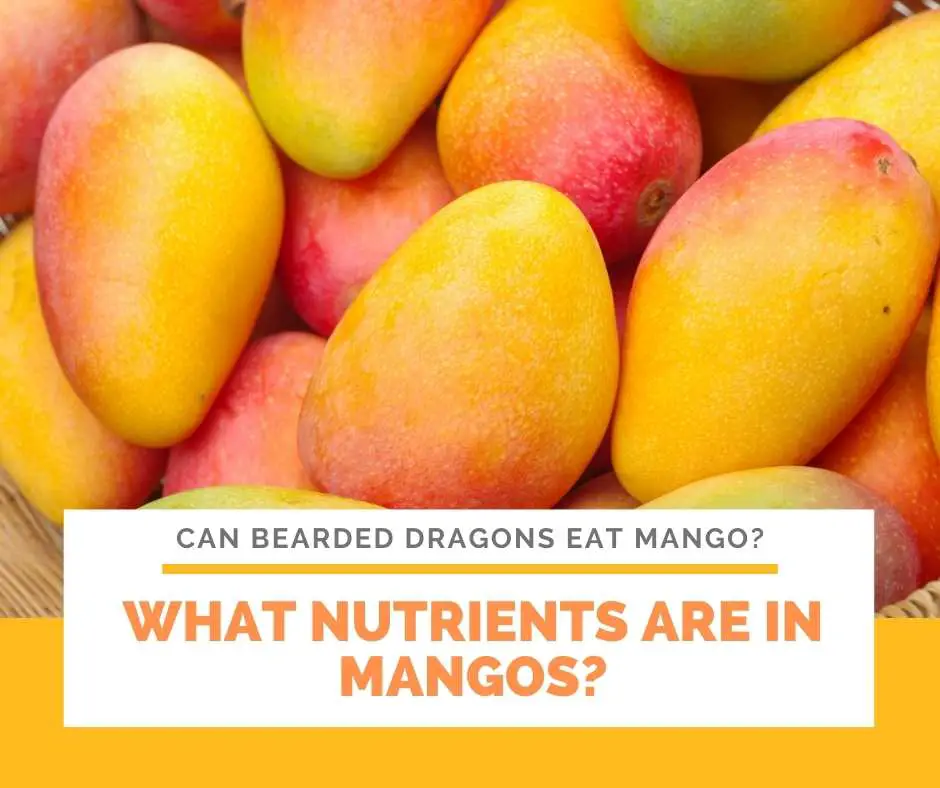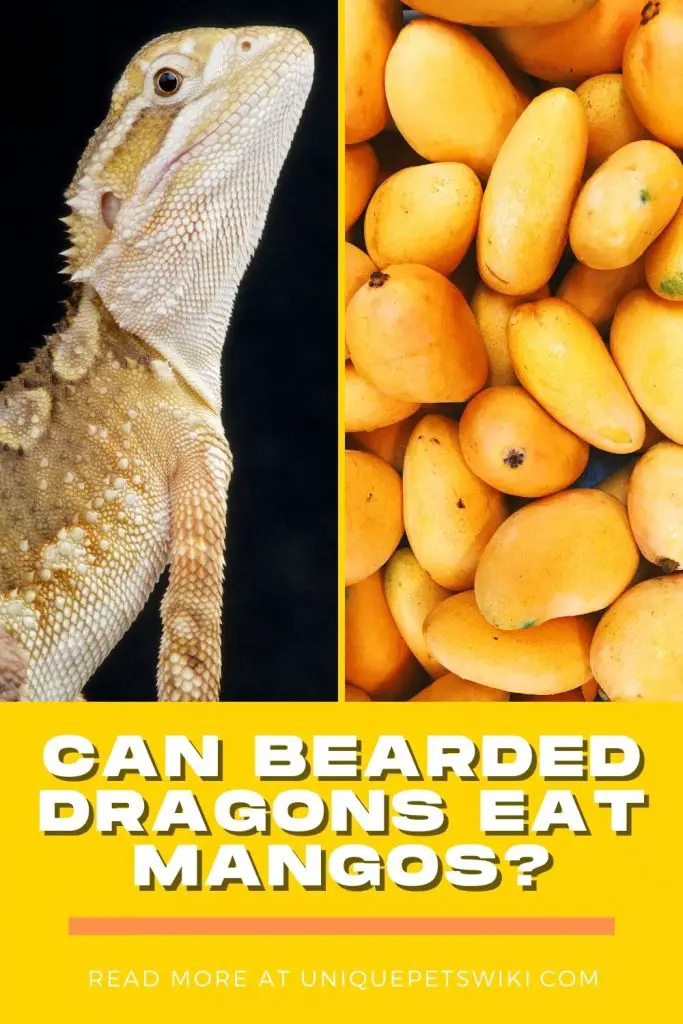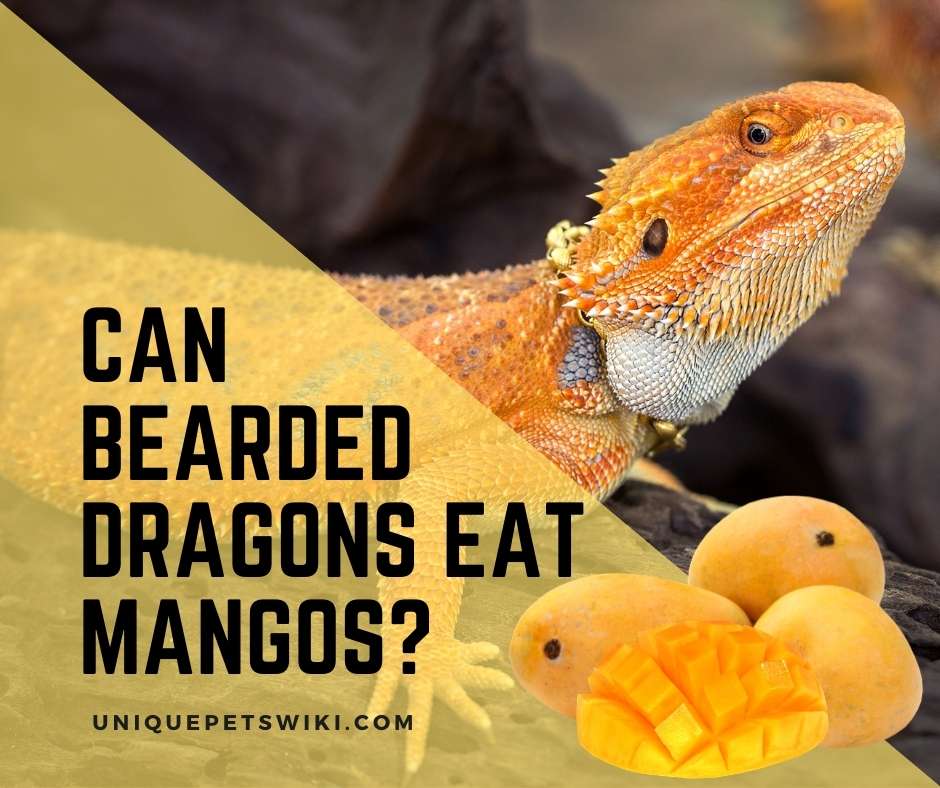Can bearded dragons eat mango, and are they safe for them? I’m delighted you asked this question, and this is where to get the answer.
Maybe you have planted some mangoes in your farm, or you can easily buy them from the grocery, and you are wondering whether bearded dragons can eat them safely. Well, our dear friends here or simply the beardies love eating sweet and juicy fruits a lot.
Of course, mango is sweet and juicy, and yes, bearded dragons can eat mango but occasionally.
Here is what we will cover further in the article
- Nutritional facts about mangoes
- Can bearded dragons eat mango
- Dried or frozen mango, or mango skin
- How often to feed mango, and lots more.
This article has been reviewed by Dr. Dilber. Read more about our knowledge control process here.
Contents
What Nutrients are in Mangos?

Mango is highly delicious and is packed with abundant nutrients. Valuable items to look for in mango is protein, fat, sugar, dietary fiber, calcium and phosphorus ratio, energy, and vitamin content.
It is only when you understand the nutrients in mango that you can decide whether it’s a safe fruit to feed your bearded dragon or not.
Let’s take a look at the nutrients that a raw mango contains in the list below. The data is sourced from USDA and is showing the nutrients in 100 grams of mango.
- Water: 83.5g
- Energy: 60kcal
- Total fat: 0.4g
- Protein: 0.8g
- Fiber: 1.6g
- Sugar: 13.6g
- Calcium: 11mg
- Phosphorus: 14mg
- Potassium: 168mg
- Vitamin A: 54µg
- Vitamin C: 36.4mg
- Sodium: 1mg
It also contains selenium, zinc, copper, high amounts of beta-carotene, lycopene, lutein, zeaxanthin, cryptoxanthin, vitamin K and E, and some fatty acids.
Can Bearded Dragons Eat Mango?

Based on the information we have seen in the list above, mangos are highly nutritious, and as you know, they are also flavorful and juicy. They are a great source of minerals, vitamins, and antioxidants.
Bearded dragons can safely feed on mangos, but keep in mind that it should be given in moderation. Mango has a sweet taste compared to the greens and veggies, and bearded dragons prefer to have such tasty and good-smelling foods.
So, you can use mango to top the salad if your bearded dragon keeps off food or does not accept some greens. As the beardie will be wandering over the bowl looking for the pieces of mango, it will eat other foods in the process, and it doesn’t notice.
However, don’t use mango as a salad topper for your lizard more often as this fruit contains more phosphorus than calcium, which dramatically interferes with calcium absorption.
Note that not two beardies are the same, so, if your dragon does not accept mango, look for other fruits to use as there are many fruits edible to bearded dragons. This includes; plums, grapes, apples, watermelon, and more.
If your bearded dragon does not have a problem eating mango, include it as part of its diet so long as you provide it in limited amounts. Mangos offer several health benefits to bearded dragons as they have numerous nutrients.
How Often to Feed Mango to Bearded Dragons?

Mango is relatively high in sugar and contains less minerals like calcium which is essential. Therefore, it cannot be fed to bearded dragons as everyday food because it can result in metabolic bone disease and other health issues.
Vet answer: Mango is best when offered with other nutritious foods or occasionally. Because it lacks some essential minerals that are necessary for bearded dragons. So, adding mango to other foods can increase the palatability due to presence of sugar in it.
Giving a few portions of mango to a bearded dragon, around 1-2 times in a month will not harm. It can be used as a salad topper, as I said earlier, or ideally included in the diet with other vegetables and greens.
It is not a good idea to fill your lizard’s stomach with foods that don’t help them much, and that is why the beardies should not eat mango every day. Ideally, fruits should make about 10% of the bearded dragon’s diet.
This is the right proportion, and the nutrients in the mango will be helpful to the beardie, but too much of it will be toxic.
Can Bearded Dragons Eat Mango Leaves, Peels and Pit?
Some bearded dragons can eat mango peels, but only if they are correctly chopped into small portions. Mango peels have essential antioxidant compounds such as carotenoids, polyphenol, and they also contain some dietary fiber and vitamins.
Antioxidants also slow down frequent aging by preventing the formation and infiltration of reactive oxygen species into the cells. However, I would not advise you to feed your beardie with mango peels because they are relatively hard and have a rough texture.
Hard foods will often make the beardies choke, so it is better to avoid them in most cases. Likewise, mango skin has pesticides, and these chemicals are not entirely removed through washing.
Mango leaves are also nutritious but don’t feed them to your pet since they are rough and can cause tongue irritation and injure the mouth lining. Mango pit is also inedible.
Should I Feed My Bearded Dragon with Frozen and Dried Mango?
Freezing the fruits and vegetables is essential to preserve nutrients, but during the blanching process, some nutrients are lost. Additionally, blanching can make the fruit lose its color and flavor.
Frozen mangoes are also preserved by adding preservatives to prevent spoilage. These preservatives are bad for the digestive health of bearded dragons.
Feeding frozen mangos to bearded dragons cannot harm them, but I would recommend you not to use these mangos. Feeding fresh foods to a bearded dragon is far much better than anything frozen. There are several fresh fruits to give to the beardies instead of feeding frozen mangos.
Similarly, you should avoid dried mangos because they are too sugary and at the same time are not fresh.
A Simple Way to Prepare Mangos for Bearded Dragons?
Preparing mangoes for bearded dragons is extremely easy; here is a procedure to follow.
- Select the right type of mango; apple mangos have low water content and can be an excellent choice to feed the beardie. Also, avoid overripe fruits because they are quite acidic due to the high content of benzoic acid.
- Harvest ripe mangoes and allow them to stay at least for two days to drain water. This helps to improve nutrient uptake by bearded dragons.
- Use warm or treated water to wash the mango to remove chemicals on the skin.
- After cleaning, allow the mango to dry for about 15 minutes, and then you can peel it.
- Cut the flesh part into small portions, smaller than the diameter of the beardie’s eye.
- Please include a few portions of the mango as part of the diet where you have greens, veggies and feeder insects and enjoy watching the pet as it eats.
Wrapping Up

There you have it, and I hope this article has been helpful to you and you got answers to most of your questions about bearded dragons and mangos.
Mangos provide vitamin A, K and C plus other minerals like calcium, zinc, sodium, potassium, etc. They also contain antioxidant compounds such as carotenoids and others that play a significant role in bearded dragons.
Mangos should only be fed to bearded dragons as occasional fruits and not as staple foods.
